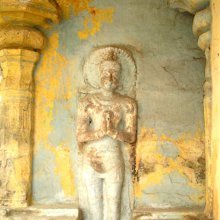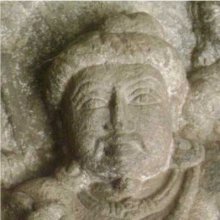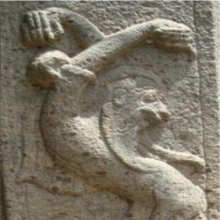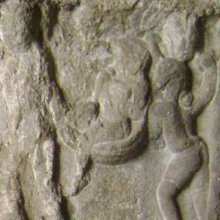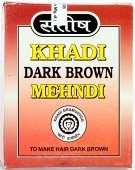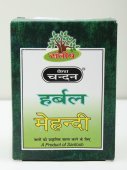Person: 1 definition
Introduction:
Person means something in Buddhism, Pali. If you want to know the exact meaning, history, etymology or English translation of this term then check out the descriptions on this page. Add your comment or reference to a book if you want to contribute to this summary article.
Images (photo gallery)
(+61 more images available)
In Buddhism
General definition (in Buddhism)
Source: A Buddhist Library: In This Very LifePerson (i.e., the meditation teacher) refers to one of the Seven types of Suitability, which should be met in order to create an environment that is supportive of meditation practice.—The fourth suitability is that of person, which chiefly relates to the meditation teacher. If the instruction given by one"s teacher helps one to progress, developing concentration that has already arisen, or bringing about concentration that has not yet arisen, then one can say that this teacher is suitable.
See also (Relevant definitions)
Starts with: Personal experience, Personal Insight, Personal restraint, Personification.
Ends with: Dead person, Disabled person, Drunken person, Healthy man, Helpless person, Poor person, Sleeping person, Wicked person, Wise person.
Full-text (+18129): Purusha, Jana, Apatra, Amuka, Prathamapurusha, Gurujana, Madhyamapurusha, Parijana, Kulajana, Pratishariram, Pudgala, Panktipavana, Mritasamjivana, Marshti, Mohanastra, Nija, Sakshat, Ashadakshina, Sattvasara, Lakshadhisha.
Relevant text
Search found 535 books and stories containing Person; (plurals include: Persons). You can also click to the full overview containing English textual excerpts. Below are direct links for the most relevant articles:
Shrimad Bhagavad-gita (by Narayana Gosvami)
Verse 6.9 < [Chapter 6 - Dhyāna-yoga (Yoga through the Path of Meditation)]
Verse 2.57 < [Chapter 2 - Sāṅkhya-yoga (Yoga through distinguishing the Soul from the Body)]
Verse 2.69 < [Chapter 2 - Sāṅkhya-yoga (Yoga through distinguishing the Soul from the Body)]
Sahitya-kaumudi by Baladeva Vidyabhushana (by Gaurapada Dāsa)
Text 7.132 < [Chapter 7 - Literary Faults]
Text 10.216 < [Chapter 10 - Ornaments of Meaning]
Text 5.2 < [Chapter 5 - Second-rate Poetry]
Kautilya Arthashastra (by R. Shamasastry)
Chapter 20 - Gambling and Betting and Miscellaneous Offences < [Book 3 - Concerning Law]
Chapter 8 - Trial and Torture to Elicit Confession < [Book 4 - Removal of Thorns]
Chapter 10 - Destruction of Pasture Lands < [Book 3 - Concerning Law]
The Great Chronicle of Buddhas (by Ven. Mingun Sayadaw)
Sakka’s Question (2): On Love and Hatred as the causes of Covetousness and Stinginess < [Chapter 39 - How the Āṭānāṭiya Paritta came to be Taught]
Two Kinds of Reflection (Paccavekkhaṇā) < [Chapter 6 - On Pāramitā]
Four Kinds of Kavi (wise person) < [Chapter 6 - On Pāramitā]
The Brahmanda Purana (by G.V. Tagare)
Chapter 15 - The Test for a Brāhmaṇa deserving for Śrāddha invitation < [Section 3 - Upodghāta-pāda]
Chapter 14 - Purification rites and the Śrāddha ritual < [Section 3 - Upodghāta-pāda]
Chapter 2 - The description of the city of Śiva < [Section 4a - Upasaṃhāra-pāda]
Mahabharata (English) (by Kisari Mohan Ganguli)
Section CLXIV < [Apaddharmanusasana Parva]
Section XXXVII < [Anusasanika Parva]
Section XXXIII < [Udyoga Parva]
Related products
(+33 more products available)
